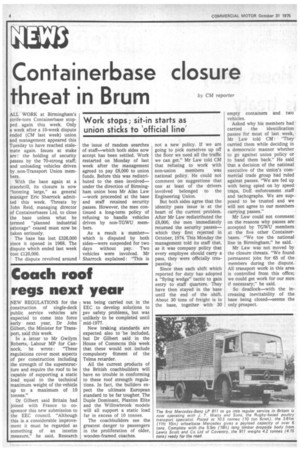Containerbase closure
Page 6

If you've noticed an error in this article please click here to report it so we can fix it.
threat in Brum by CM reporter
Work stops; sit-in starts as union sticks to 'official line'
ALL WORK at Birmingham's strife-torn Containerbase stopped again this week. Only a week after a 10-week dispute ended (CM last week) union and management appeared this Tuesday to have reached stalemate again. Issues at stake are : the holding of security passes by the 70-strong staff; and unloading vehicles driven by non-Transport Union members.
With the base again at a standstill, its closure is now "looming large," as general manager Eric Sharrock admitted this week. Threats by John Reid, managing director of Containerbases Ltd, to close the base unless what he termed "planned industrial sabotage" ceased must now be taken seriously.
The base has lost £326,000 since it opened in 1968. The dispute which ended last week cost £120,000.
The dispute revolved around the issue of random searches of staff—which both sides now accept has been settled. Work restarted on Monday of last week after the management agreed to pay £8,000 to union funds. Before this was redistributed to the men involved— under the direction of Birmingham union boss Mr Alan Law —work proceeded at the base and staff retained security passes. However, the men continued a long-term policy of refusing to handle vehicles driven by non-TGWU members.
As a result a number— which is disputed by both sides—were suspended for two days without pay. Two vehicles were involved. Mr Sharrock explained : "This is not a new policy. If we are going to pick ourselves up off the floor we need all the traffic we can get." Mr Law told CM that refusing to work with non-union members was national policy. He could not comment on suggestions that one at least of the drivers involved belonged to the Engineering Union.
But both sides agree that the identity pass issue is at the heart of the current problem. After Mr Law redistributed the £8,000, the men immediately returned the security passes— which they first rejected in October, 1974. This Monday the management told its staff that, as it was company policy that every employee should carry a pass, they were officially trespassing.
Since then each shift which reported for duty has adopted a "flying wedge" tactic to gain entry to staff quarters. They have then stayed in the base until the end of the shift. About 30 tons of freight is in the base, together with 30 empty containers and two vehicles.
Asked why his members had carried the identification passes for most of last week, Mr Law told CM: "They carried them while deciding in a democratic manner whether to go against union policy or to hand them back." He said that a decision of the national executive of the union's commercial trade group had ruled against passes. "We are fed up with being spied on by speed traps, DoE enforcement staff and tachographs. We are supposed to be trusted and we will not agree to our members carrying passes."
Mr Law could not comment on the reasons why passes are accepted by TGWU members at the five other Containerbases. "We toe the national line in Birmingham," he said.
Mr Law was not moved by the closure threats. "We found permanent jobs for 65 of the members during the dispute. All transport work in this area is controlled from this office; we could get work for our men if necessary," he said.
So deadlock—with the increasing inevitability of the base being closed—seems the only prospect.
































































































